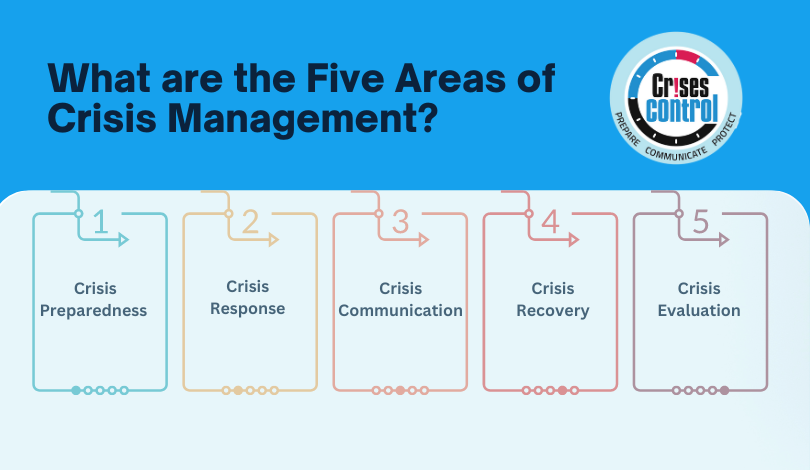Are you prepared to navigate through the storm when a crisis hits? In the blink of an eye, a crisis can strike, leaving businesses in disarray and scrambling to mitigate the impact. In such turbulent times, having a solid crisis management plan becomes a lifeline. It’s not just about survival; it’s about turning the tide in your favour and emerging stronger from adversity. From natural disasters to cyber threats and unforeseen incidents, the ability to effectively handle crises can make or break a company’s reputation and operations.
In this blog, we will explore the five key areas of crisis management and unveil how Crises Control, a leading crisis management tool, can be your trusted companion in weathering the storm. So, let’s dive in and discover how you can turn a crisis into an opportunity for growth!
Definition of Crisis Management
Crisis management refers to the process of identifying potential crises, formulating strategies to prevent or minimise their impact, and effectively responding to and recovering from such events. It involves a series of interconnected activities, including planning, communication, resource allocation, and evaluation. By implementing a comprehensive crisis management framework, businesses can effectively navigate turbulent times.
Trends and Challenges in Crisis Management
Evolving Landscape of Crises
The world is witnessing a constant evolution of crises, ranging from natural disasters and cyber threats to pandemics and reputational crises. It is essential for businesses to stay updated on the types of crises that can potentially impact their operations and reputation. By having a clear understanding of the ever-changing landscape, organisations can better prepare themselves to mitigate the impact of crises.
Emerging Risks
With advancements in technology and the interconnectedness of global economies, new risks continue to emerge. It is crucial for businesses to identify these emerging risks and assess their potential impact on the organisation. By proactively identifying and addressing these risks, organisations can enhance their crisis management strategies and minimise vulnerabilities.
Importance of Staying Ahead
In the face of evolving crises and emerging risks, staying ahead of the curve is vital for organisations. Proactive crisis management allows businesses to anticipate potential crises, develop robust response plans, and minimise the impact on operations and reputation. By prioritising crisis preparedness and utilising tools like Crises Control, businesses can effectively navigate through turbulent times.
The Five Areas of Crisis Management
Crisis Preparedness: Fortify Your Defences
Being prepared is half the battle won. Crisis preparedness involves taking proactive measures to identify potential risks, assess vulnerabilities, and formulate comprehensive strategies to prevent, mitigate, and manage crises. Crises Control assists you in creating a robust crisis management team, developing crisis management protocols, and designing tailor-made crisis response plans. With Crises Control as your ally, you can stay one step ahead and navigate through the storm with confidence.
Crisis Response: Swift and Decisive Action
When a crisis strikes, every second counts. The ability to respond swiftly and decisively can significantly minimise the impact and restore normalcy sooner. Crises Control provides real-time incident reporting, enabling you to gather crucial information rapidly. With clear lines of communication, task assignments, and progress tracking, Crises Control ensures that your crisis response efforts are well-coordinated and effective.
Crisis Communication: Speak with Clarity and Consistency
Effective communication is the cornerstone of crisis management. During times of uncertainty, maintaining transparent and timely communication with internal teams, stakeholders, and the public is paramount. Crises Control’s automated notification system ensures that key messages reach the right people at the right time, across multiple communication channels. By delivering consistent and accurate information, you can instil confidence and retain trust, even in the face of adversity.
Crisis Recovery: Bounce Back Stronger
After the storm subsides, it’s time to regroup and rebuild. Crisis recovery involves assessing the damages, implementing remedial actions, and gradually restoring normal operations. With Crises Control by your side, you can streamline the recovery process. The platform allows you to assign tasks, track their progress, and ensure accountability. By efficiently coordinating the efforts of your teams and resources, you can accelerate the recovery phase and emerge stronger from the crisis.
Crisis Evaluation: Learning from the Past
To prevent future crises and enhance your crisis management capabilities, it’s crucial to evaluate your response to the current crisis. Crises Control facilitates the evaluation process by providing a platform for capturing data and documenting critical information. By analysing response performance and identifying areas for improvement, you can continuously refine your crisis management strategies and enhance your organisation’s resilience.
Conclusion
Crisis management is a crucial aspect of any business’s strategy. By proactively preparing for crises, responding swiftly and effectively, communicating transparently, recovering with resilience, and continuously evaluating and improving, organisations can navigate through turbulent times successfully. Crises Control offers a comprehensive set of features designed to assist businesses in each of these areas. With its streamlined communication, real-time incident reporting, automated notification system, task assignment and tracking, and data and document management capabilities, Crises Control empowers organisations to weather the storm and emerge stronger than ever. Contact us to get in touch with one of our experts. Click the link to learn how Crises Control can protect your organisation.







